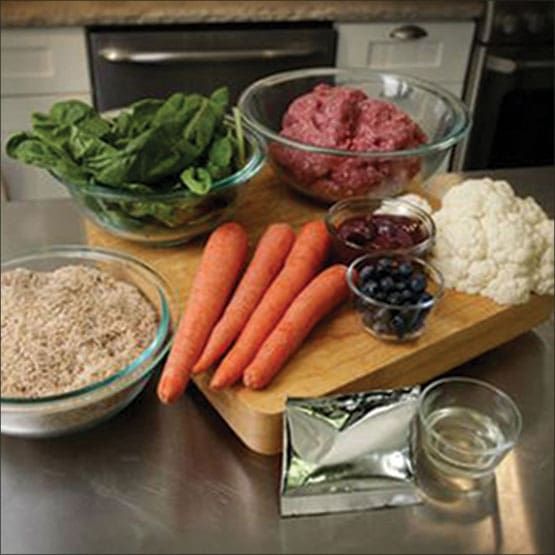Three months ago, I asked, “Why can’t veterinary nutritionists design recipes that meet most nutritional needs through the use of whole foods, rather than synthetic supplements?” The question appeared in my article “Dishing On Diets” (WDJ September 2013), about a study claiming that most homemade diet recipes are incomplete and unbalanced. I pointed out that most veterinary nutritionist recipes consist of minimal whole foods and rely heavily on supplements to meet nutritional needs. My (secret) hope was to plant a seed that might someday bear fruit, but I didn’t realize that my challenge had already been met.

JustFoodForDogs was started almost three years ago in Newport Beach, California. The company is led by Dr. Oscar Chavez, DVM, whose focus has been clinical nutrition since graduating from the Royal Veterinary College in London. From 2010 to 2013, Dr. Chavez was director of the Animal Health Science veterinary technology program at California State Polytechnic University, Pomona, and he remains an adjunct professor of canine clinical nutrition there. Dr. Chavez is also a member of the American Academy of Veterinary Nutrition.
JustFoodForDogs offers cooked, frozen JustDailyMeals, made from high-quality whole foods free of hormones, preservatives, and artificial colors and flavorings. These meals include meat or fish, organs, vegetables, fruits, and oils, along with potatoes and sweet potatoes in their grain-free recipes, and white rice, brown rice, and macaroni in the rest. The company says that all the ingredients, including supplements, are USDA- or FDA-approved for human consumption. All these meals have plenty of protein, but the amount of fat varies widely, from low-fat fish to higher-fat lamb and beef. Delivery is available in parts of southern California, or foods can be shipped anywhere in the U.S. The cost ranges from $3.60 to $6.74 per pound, plus shipping.
Instead of using the same vitamin and mineral blend for all foods, JustFoodForDogs customizes a blend specific to each recipe. This is highly unusual in the pet food market; most companies use the same supplement premix for all their foods, as it’s more economical. The downside of using the same supplements for all foods is that there may be far more than is needed of some nutrients, and ratios may not be properly balanced. Note that the nutrient guidelines established by the Association of American Feed Control Officials (AAFCO) and the National Research Council (NRC) do not require specific ratios other than calcium:phosphorus, and their maximums allow for a very wide range of nutrients.
For example, beef and lamb liver are high in copper, so there’s no need to add copper to recipes that include either of those, but poultry meat and organs have little copper, so copper must be added to poultry-based diets. If the same premix is used for all foods, those that include beef or lamb liver will have more copper than is needed, which will upset the ideal 10:1 ratio of zinc to copper. A study published this year in the Journal of the American Veterinary Medical Association found increased copper accumulation in the liver of Labrador Retrievers, both with and without liver disease, most likely the result of increased exposure via their diets. This may be a side effect of feeding foods with more copper than is appropriate.
As another example, I’ve seen recipes that relied on Balance IT (a vitamin/mineral supplement used extensively by veterinary nutritionists ) where twice as much of the supplement as would otherwise be needed was prescribed in order to ensure that there was more calcium than phosphorus in a recipe relatively high in meat (apparently Balance It’s program doesn’t have an option for adding additional calcium separately).
The only other companies I know of using individualized supplement blends are Darwin’s Natural Pet Products and Raw Bistro Pet Fare. Both companies consulted with Steve Brown (founder of Steve’s Real Food for Dogs and author of See Spot Live Longer, seespotlivelonger.com), who insists on customized supplement premixes for the companies he works with, to ensure that their frozen raw foods are complete and balanced.
I was delighted to see that the company also offers JustDoItYourself kits, which include the recipe for each Daily Meal, along with their customized nutrient mixture, so that you can make the same meals yourself at home. The cost per kit, enough to make about 30 pounds of food, is $18 (shipping is free).
JustFoodForDogs also offers Vet Support Diets, designed for dogs with kidney disease, cancer, digestive disorders, and allergies. I was pleased to see that their kidney diets are not overly restricted in protein, while still being low in phosphorus. All of the Vet Support diets except their ultra-low-fat Balanced Remedy require a veterinary prescription. Unfortunately, the company does not currently offer JustDoItYourself kits for their Vet Support Diets, but may consider doing so in the future through veterinarians.
Not all dogs are willing to eat home-prepared meals with spoonfuls of added supplement powder, which change the smell and taste of the food. Another benefit to using whole foods to meet more of a dog’s nutritional requirement, and to using customized supplement blends, is that less supplement powder is added to the food. Minimizing supplements makes the food more palatable, especially for sick dogs whose appetite may already be compromised.
The company will also design customized diets for dogs with health problems, including an individualized nutrient blend designed to make the recipe complete. Health issues commonly addressed include obesity, digestive disorders, pancreatitis, diabetes, liver and kidney disease, and more. A blood panel from your vet is typically required. There is a one-time fee of $195 to cover the cost of formulating the recipe and nutrient blend. You can then choose to have the company make the food for you, or you can buy the supplement mixture and the recipe to make yourself at home. This is a much improved option for those whose dogs have health issues than the typical recipe created by a veterinary nutritionist. It’s also likely to be more palatable for your dog with more real food and less supplement powder per meal.
JustFoodForDogs offers other supplements and treats, including what the company claims is USDA dehydrated chicken breast, a safer option than the vast majority of chicken jerky products on the market that use chicken imported from China and have been linked to kidney failure in dogs.
Finally, I applaud the company’s unique use of feeding trials using dogs living in family homes rather than a research environment. Cal Poly Pomona helped to develop feeding trial protocols that meet AAFCO guidelines, considered the “gold standard” for proving nutritional adequacy. The study tested their daily recipes over a six-month period, with all participants passing with flying colors.






